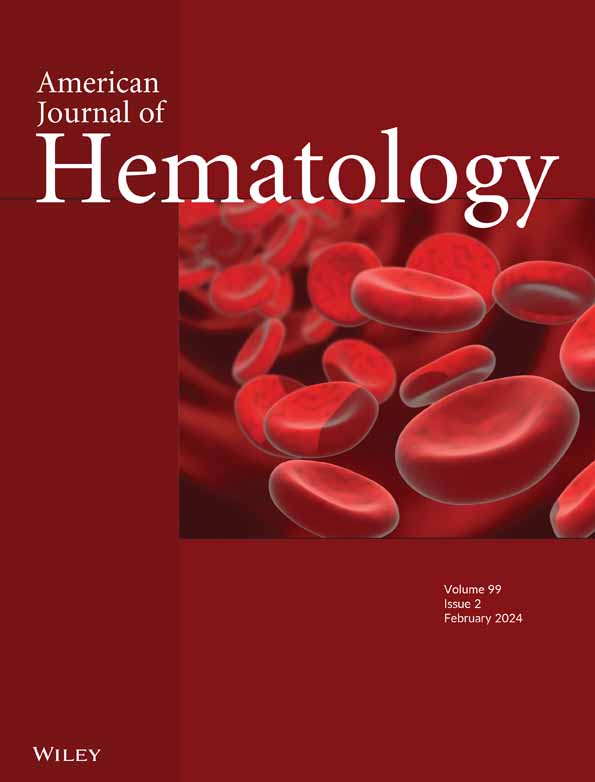癌症患者诊断前克隆造血潜能不确定与预后的关系
IF 9.9
1区 医学
Q1 HEMATOLOGY
引用次数: 0
摘要
不确定电位克隆造血(CHIP)可能影响几种癌症类型的预后。由于以往的研究主要集中在癌症诊断后的CHIP,因此对于癌症诊断前的CHIP是否能预测预后知之甚少。我们进行了一项前瞻性队列研究,包括英国生物银行2006年至2022年期间的63486名癌症患者,以评估诊断前CHIP与癌症患者生存之间的关系。采用Cox回归模型计算风险比(HR)和95%置信区间(CI)。我们确定了2860例癌症和预诊断CHIP患者,以及60626例没有CHIP的癌症患者。在4.2年的中位随访期间,CHIP组有1162例患者死亡(921例癌症特异性死亡),对照组有17825例患者死亡(14785例癌症特异性死亡)。与对照组相比,诊断前CHIP的癌症患者表现出更高的总死亡率(HR 1.18, 95% CI: 1.11-1.25)和癌症特异性死亡率(HR 1.17, 95% CI: 1.09-1.25)。在骨髓增殖性肿瘤、多发性骨髓瘤、乳腺癌、非霍奇金淋巴瘤和急性髓性白血病/骨髓增生异常综合征中观察到总体死亡率和癌症特异性死亡率的显著相关性。TET2、SRSF2或JAK2突变的CHIP患者总死亡率和癌症特异性死亡率均增加。这些研究结果表明,癌症患者在诊断前患有CHIP时应提高临床意识。本文章由计算机程序翻译,如有差异,请以英文原文为准。
Association of Pre-Diagnostic Clonal Hematopoiesis of Indeterminate Potential With Prognosis Among Patients With Cancer.
Clonal hematopoiesis of indeterminate potential (CHIP) might impair prognosis of several cancer types. Since previous studies predominantly focused on CHIP after cancer diagnosis, little is known about whether CHIP prior to cancer diagnosis predicts outcome. We performed a prospective cohort study, including 63 486 patients with cancer during 2006 to 2022 in the UK Biobank, to evaluate the association between pre-diagnostic CHIP and survival of cancer patients. Hazard ratios (HR) and 95% confidence intervals (CI) were calculated using Cox regression models. We identified 2860 patients with cancer and pre-diagnostic CHIP, and 60 626 cancer patients without CHIP. During a median follow-up of 4.2 years, 1162 patients died in the CHIP group (921 cancer-specific deaths), and 17 825 in the reference group (14 785 cancer-specific deaths). Cancer patients with pre-diagnostic CHIP exhibited a higher rate of overall death (HR 1.18, 95% CI: 1.11-1.25) and cancer-specific death (HR 1.17, 95% CI: 1.09-1.25) compared with the reference group. A significant association of both overall death and cancer-specific death was observed for myeloproliferative neoplasms, multiple myeloma, breast cancer, non-Hodgkin lymphoma, and acute myeloid leukemia/myelodysplastic syndromes. The increased rate of both overall death and cancer-specific death was noted for CHIP with TET2, SRSF2, or JAK2 mutation. These findings suggested extended clinical awareness in cancer patients with pre-diagnostic CHIP.
求助全文
通过发布文献求助,成功后即可免费获取论文全文。
去求助
来源期刊
CiteScore
15.70
自引率
3.90%
发文量
363
审稿时长
3-6 weeks
期刊介绍:
The American Journal of Hematology offers extensive coverage of experimental and clinical aspects of blood diseases in humans and animal models. The journal publishes original contributions in both non-malignant and malignant hematological diseases, encompassing clinical and basic studies in areas such as hemostasis, thrombosis, immunology, blood banking, and stem cell biology. Clinical translational reports highlighting innovative therapeutic approaches for the diagnosis and treatment of hematological diseases are actively encouraged.The American Journal of Hematology features regular original laboratory and clinical research articles, brief research reports, critical reviews, images in hematology, as well as letters and correspondence.

 求助内容:
求助内容: 应助结果提醒方式:
应助结果提醒方式:


